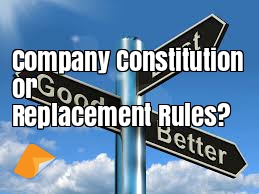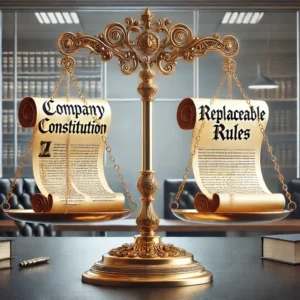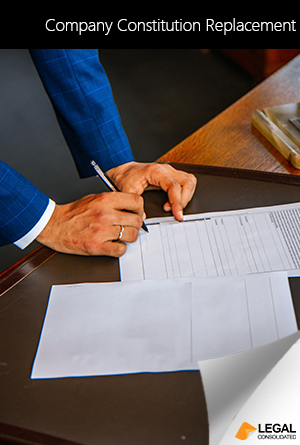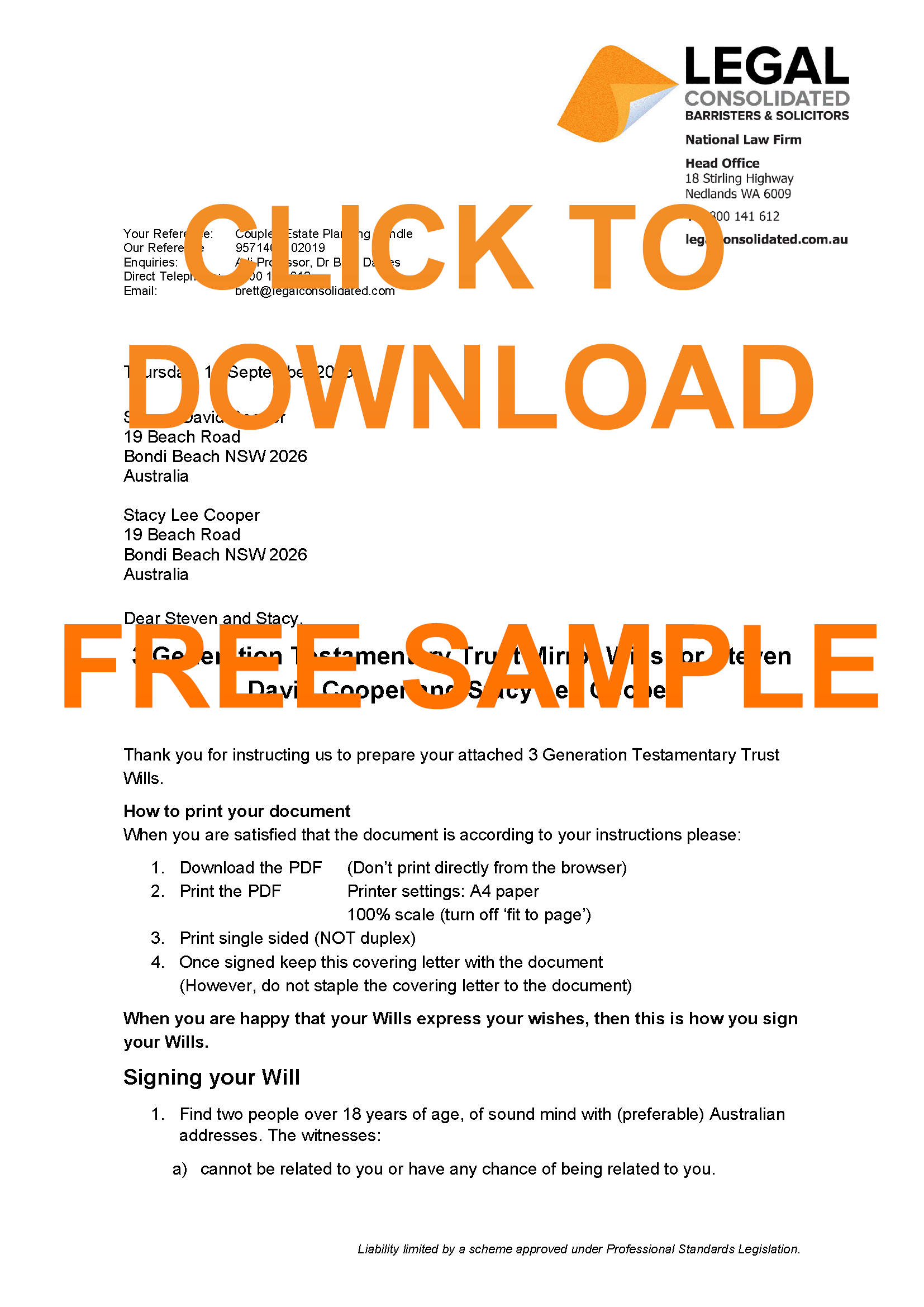- a Constitution – a set of rules for your Company (it is free for all Legal Consolidated companies); or failing that
- Replacement Rules – which are set out in the Corporations Act 2001

- a company that has one person who is both the sole director and sole shareholder;
- a Self-Managed Super Fund corporate trustee (special purpose company)
Company Constitution v Replaceable Rules. Which is safer?
The default Replaceable Rules are the bare minimum. There are many additional powers that a Company should have – that only a Constitution (preferably prepared by a law firm) contains.The government gives you the Replacement Rules for free
The government hands out Replaceable Rules for free, but remember, there is rarely such a thing as a free lunch — especially when it is served by the government. Accepting these ‘gifts’ may come with strings attached. This is often in the form of less control and more surprises as legislation changes. It is like receiving a jumper from your aunt; it might not fit, and you cannot change it without upsetting someone. Better to get your own company constitution than to wear something off the rack that unravels at any moment.Can the Government Change Your Replaceable Rules Without Your Knowledge?
Yes, Replaceable Rules are subject to amendments by the government. This happens without any notification to your company. These changes reflect the government’s latest societal fads. Your business’s specific needs rarely align. Risks are introduced by this unpredictability. This is especially when changes impact governance and shareholder rights. This is in ways that are not advantageous to your company. For example, imagine the government suddenly mandates that every company board must include a female director. Or, or that each board meeting must begin with the singing of the national anthem. Another potential change could require all company investments to be in hydrogen-friendly initiatives. This aligns with government pet projects but not necessarily with your company’s focus. In contrast, the shareholders establish a company constitution. The constitution offers a stable and controlled governance framework. Tailored specifically to the company’s requirements, it can only be amended with the shareholders’ consent. This process ensures that any modifications are made transparently. It keeps the control of the company firmly in the hands of its shareholders. It is not subject to the whims of government fads. This way, shareholders maintain authority over their company’s strategic direction and governance practices. It safeguards their interests against capricious legislative changes. In summary, replaceable rules are subject to the Corporations Act. When legislative amendments are made, the company must slavishly follow the new changes. The directors and shareholders are not told of these changes. However, ignorance is no excuse. In contrast, a Legal Constitution constitution allows the company to keep control.Understanding Replaceable Rules Under the Corporations Act 2001
Section 135 of the Corporations Act 2001 introduces Replaceable Rules, which apply to all companies that do not build a constitution. These rules provide little provisions for governance, serving as merely a default framework for corporate management. They lack customisability, adhering strictly to the restrictions outlined in the Corporations Act 2001.Dangers of Replaceable Rules for an Australian Pty Ltd company
Replaceable rules in Australian corporate law serve as a default set of rules that govern a company’s internal management. They are provided and controlled by the Corporations Act 2001. These rules apply unless a company decides to adopt its own constitution. Court cases where replaceable rules posed a problem revolve around misunderstandings or misapplications of these strange and confusing rules. This is especially in situations where the directors and shareholders are unaware of changes by the government. With Replacement Rules legal issues arise when:- Shareholder disputes: Disputes among shareholders, especially in smaller companies, are problematic if the replaceable rules are assumed to adequately cover all scenarios. They usually do not.
- Director liability: Directors find themselves in difficult legal positions. This is if they are not aware of the changing nuances of replaceable rules.
Advantages of Using an Australian Law Firm to Build Your Company Constitution
When you choose to build your company’s constitution through an Australian law firm, such as Legal Consolidated Barristers & Solicitors, you benefit from a unique blend of legal protection and expert guidance. Here are the three key advantages:
- Legal Professional Privilege: By working directly with a law firm, all your communications are protected by legal professional privilege. This ensures that your discussions, strategies, and sensitive information remain confidential, safeguarded from any legal disputes or inquiries. This protection usually extends to your accountant and financial planner as well.
- Expert Legal Advice: Our online building process guides you through each step of the constitution-building process, ensuring that all your questions are answered thoroughly.
- Access to Comprehensive Resources: You gain access to a free sample of our cover letter and the constitution, complete with explanatory notes. These resources are designed to educate and inform you about the legal framework governing your company, helping you make informed decisions.
Advantages of Using a Legal Consolidated Constitution Over Replaceable Rules
When you build a Legal Consolidated Barristers & Solicitors Constitution, you are investing in a well-drafted legal instrument designed to ensure robust governance and advanced business succession planning. Here is why a constitution built by Legal Consolidated benefits you:-
Expertise in Business Succession:
The foundation of our constitutions is rooted in deep expertise, with a doctoral background in business succession planning. Our preemptive rights are cutting-edge, designed to protect your business legacy.
-
Tag Along clauses in the Constitution:
This feature ensures that minority shareholders are treated fairly, mandating that they can sell their shares under the same conditions as majority shareholders, thus avoiding potential exploitation or unfavourable terms.
-
Accountant-Friendly Valuation in the Constitution:
Our constitutions include Generally Accepted Accounting Principles-compliant valuation powers that facilitate clear, accountable financial assessments, making them highly favoured by professional accountants.
-
Constitution clause for Profit Distributions Flexibility:
Constitutions built by Legal Consolidated allow for profit distributions even in the absence of ‘profit’ as defined by the Australian Taxation Office, providing more flexibility in managing cash flow and rewarding shareholders.
-
Versatile Share Structuring:
With over thirty different classes of shares available, our constitutions provide a flexible framework that can be tailored to meet diverse investor needs and preferences, enhancing investment appeal. In contrast in the default Replaceable Rules carry equal rights.
-
Modern Communication Tools:
Recognising the importance of modern communication, our constitutions facilitate the use of Skype and the Internet for director and shareholder meetings, ensuring efficient and accessible governance.
-
Built-In Division 7A Loan Deeds in our Constitution:
Each constitution built by Legal Consolidated comes with built-in Division 7A Loan Deeds for all shareholders, safeguarding against potential tax implications and ensuring compliance with complex tax laws.
Choosing a constitution built by Legal Consolidated over the basic Replaceable Rules provided by the government shows you are committed to enhancing your company’s control and flexibility, and fortifying its legal standing. This choice aligns your business with a sophisticated, tailored governance framework that supports your specific needs and strategic goals.Replace Australian Lost Company Constitution
Advantages and disadvantages of Replaceable Rules for a Company
| Governance Option | Description | Advantages | Disadvantages | When to Use |
|---|---|---|---|---|
| Company Constitution | The Legal Consolidated company constitution is a tailored document that governs the internal management and decision-making processes of the company. It is a contract between the company, its members, directors, and the company secretary, specifically designed to meet comprehensive legal standards. | Flexibility to customise rules based on business needs, Stability (only shareholders can amend), Enhanced control over company structure and operations via the Legal Consolidated framework | Initial effort required, but a worthwhile long-term investment. Most law firms, including Legal Consolidated, provide a Constitution at no additional charge. | Every Australian Pty Ltd is better off with a Constitution because it secures governance stability, allows for tailored rules that suit specific business needs, and supports strategic planning and investor confidence. This governance framework is essential for growth and adaptability. |
| Replaceable Rules | Replaceable rules are the default governance structure under the Corporations Act 2001. They provide a basic set of rules for managing operations and decision-making, but they are not as flexible or customisable as the Legal Consolidated company constitution. They are prone to changes at the whim of the government. | Replaceable Rules are a free gift from the Commonwealth government. Be wary of gifts from the government. | Subject to government changes, not tailored to specific business needs, provides limited control over governance structures | While replaceable rules can initially simplify the setup for very small or new businesses, they lack the specificity and robustness required for effective governance as the business grows. It is generally advisable for any Australian Pty Ltd, regardless of size, to adopt a Constitution to ensure proper management and future scalability. |

